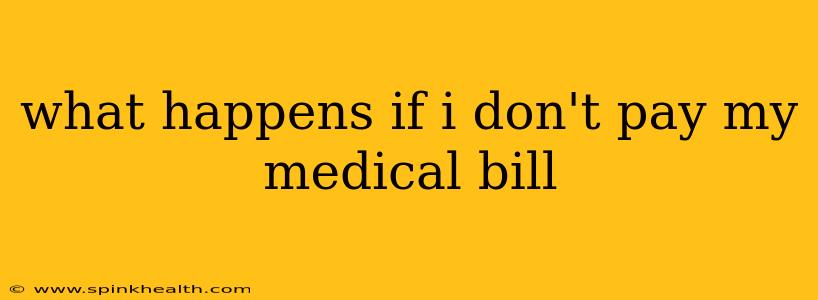What Happens If I Don't Pay My Medical Bill? A Story of Missed Payments and Their Consequences
Let's be honest, nobody enjoys receiving medical bills. The hefty sums can feel overwhelming, especially after already grappling with illness or injury. But what happens if you simply can't afford to pay, or you unintentionally let the bill slip through the cracks? The consequences, unfortunately, can range from minor inconveniences to serious financial repercussions. Let's explore the potential scenarios, drawing on real-world experiences and expert advice.
Imagine Sarah, a young freelance writer who recently underwent a minor surgery. The bill arrived, a shocking $5,000, far more than she had anticipated. Overwhelmed, Sarah initially put it aside, hoping things would improve financially. This, unfortunately, is a common reaction, but it's rarely the best course of action.
What Happens to My Credit Score If I Don't Pay My Medical Bills?
This is often the first question people have. Sarah's situation highlights this concern. Medical bills, unlike many other debts, are frequently reported to credit bureaus. Nonpayment can significantly damage your credit score, making it harder to secure loans, rent an apartment, or even get a job in some cases. A dinged credit score can follow you for years, impacting your financial life far beyond the original debt.
Can My Medical Bills Go to Collections?
Yes, absolutely. If you don't pay your medical bills, the provider will likely send the debt to a collections agency. Collections agencies are known for their aggressive tactics—repeated phone calls, letters, and even potential legal action. This can lead to significant stress and further damage your credit rating. Sarah found herself bombarded with calls from a collections agency, adding to her already considerable anxiety.
Will I Be Sued Over Unpaid Medical Bills?
While less common than collections, lawsuits are a possibility for significant unpaid medical debts. The provider or collections agency may file a lawsuit to recover the debt. This can result in a court judgment against you, potentially leading to wage garnishment or bank levy – meaning money is directly taken from your paycheck or bank account.
What Happens If I Can't Afford to Pay My Medical Bill?
This is where proactive communication becomes crucial. Instead of ignoring the bill, Sarah should have contacted the provider immediately. Many healthcare providers offer payment plans, financial assistance programs, or are willing to negotiate a reduced payment amount. There are also several charitable organizations that can help individuals cover medical expenses. Exploring these options would have saved Sarah a significant amount of stress and potential financial damage.
What Are My Options If I'm Facing Difficulty Paying Medical Bills?
There are a surprising number of options available to individuals struggling with medical debt:
- Negotiate a payment plan: Contact the provider directly and ask about setting up a manageable payment plan.
- Apply for financial assistance: Many hospitals and clinics offer financial assistance programs for low-income individuals.
- Explore charitable organizations: Organizations like the Patient Advocate Foundation can provide guidance and support in navigating medical debt.
- Consider debt consolidation: If you have multiple medical bills, consider consolidating them into a single loan with a lower interest rate.
In short, ignoring your medical bills is a risky strategy. Open communication with your healthcare provider and exploring available resources are far better approaches. Proactive steps can prevent serious long-term financial and emotional consequences. Remember, Sarah's story, while fictional, reflects the reality many people face. Don't let it become your story. Take action, and seek help if needed.

